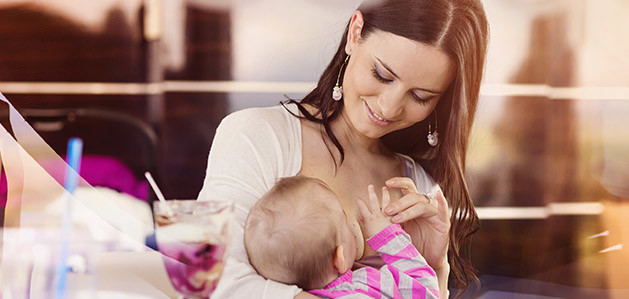As a young mother, Krenare Salihu has encountered prejudice while feeding her baby in public places. She says that she has been stared at strangely by others, they give her looks that say, “how can someone breastfeed their baby in public without any hesitation?” and their disapproval has made her leave the place where she was feeding her child and go somewhere else.
“There were times when I would feed my daughter in a public place, since food is a crucial for a baby’s development and I would never let my baby cry as a consequence of food delay. Even though many of my friends and family criticized me, since this act can be seen as disrespectful to society, I still didn’t let my daughter cry. But I admit that I’ve changed places– there have been times when I entered in my car just to avoid the staring. I even practiced other ways of feeding my baby,” Salihu says.
Dafina Krasniqi, programs coordinator at “Aksioni për Nëna dhe Fëmijë” (Action for Mother and Children, AMC), an organization that deals with problems relating to the health of mothers and children, says that the prejudices and the opinion that the breastfeeding process is shameful is eminent in both rural and urban places. Breastfeeding a child is seen as an unaesthetic act, instead of as a physiological need that should be addressed immediately. Krasniqi remarks that the consequences of these prejudices can negatively affect the both the baby’s and the mother’s health.
“Keeping postpartum depression in mind, there are many factors that impede mothers from overcoming the mood changes that may come right after birthing. When a mother cannot cope with these changes, facing prejudices like those that come with public breastfeeding can impact further processes in a child’s growth and can impact the health of the mother as well, thus worsening the depression she is experiencing,” Krasniqi asserts.
However, I.M (name known to the newsroom), says that she never considered it acceptable to feed her three children in public places while they were growing up.
“No, I have never and I would never feed my children in front of someone else. Firstly, I consider it as a disrespect towards society, and secondly, I personally would not feel comfortable feeding my child in public places,” I.M says.
Krasniqi also says that it is a choice of the mother if she wants to feed her child in public places or not. Furthermore, she finds it very courageous if she decides to breastfeed her child.
“I don’t think there is any rule that would stop a mother if choose to breastfeed her child in public. If we view breastfeeding from a medical aspect, it is preferable that the mother takes care of her child no matter the place. If she is able to feed her child, which is a good fortune for a mother, she should have the courage to do it.”
Samedin Rexhepi, a pediatrician in the Municipality of Lipjan, says that it is very human and preferable to feed the child, no matter if the mother is in a place surrounded by people.
“It is not a sin, nor any kind of violation, nor a crime or violation of norms. On the contrary; it is a feeling, an act, a human act. Feeding the child is something necessary. We are talking about feeding and not at all about indecency.” Rexhepi says.
Delaying a baby food for many hours in order to not interrupt the tranquility of open spaces, or because of the mother’s tendency to want to avoid the staring and the prejudices of others, can negatively affect the baby’s health.
“It doesn’t have an impact if it is for a short period of time; it can just affect the baby’s mood. But if the child doesn’t get fed for a longer period, e.g. a couple of hours, and if the only kind of food the baby receives is breastfeeding, it can affect the baby negatively. It depends also on the climate, atmospheric conditions, and the season as well; if we are in summer and it is hot, the baby may become dehydrated if he doesn’t get breastfed, since the only way of keeping homeostasis or liquids balance is through feeding,” Rexhepi added.
The Assembly of the Republic of Kosova based on the article 65(1) of Kosovo’s Constitution approved the law for the protection of breastfeeding: “This law protects breastfeeding through encouraging and promoting it and by placing restrictions on the marketing of certain artificial products, defined according to this law for feeding babies and small children.”
Even though mothers may not feel comfortable feeding their babies in public because of the prejudices, it is preferable for them to be courageous and make feeding their children a priority.
Fatbardha Terpeza








